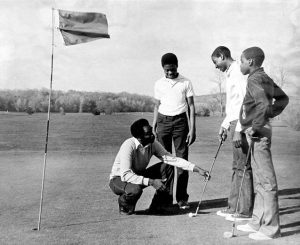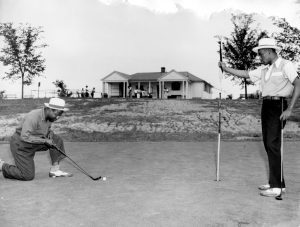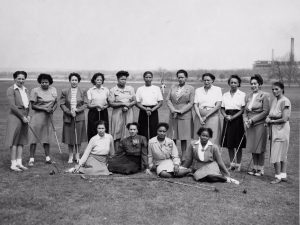A SENSE OF PLACE – LANGSTON GOLF COURSE

A golf course can be much more than just a collection of tees, fairways, bunkers, and greens. Sometimes it can evolve into a home away from home, an informal community center, a gathering place where lifetime friendships are created. Langston Golf Course in Washington D.C. has been all of that and more for generations of African-Americans.
 After a very rudimentary nine-hole course built near the Lincoln Memorial and open to African-Americans closed in the late 1920s, two local golf clubs – the Royals men’s golf club and the Wake-Robin women’s golf club – pushed for the creation of another place of their own to play. That finally happened 1939 with a nine-hole course built in the northeast part of the city along the Anacostia River. Named after John Mercer Langston, the first African-American Congressman from Virginia (elected in 1888), the course quickly became a popular venue despite uneven playing conditions. A second nine was added in the 1950s.
After a very rudimentary nine-hole course built near the Lincoln Memorial and open to African-Americans closed in the late 1920s, two local golf clubs – the Royals men’s golf club and the Wake-Robin women’s golf club – pushed for the creation of another place of their own to play. That finally happened 1939 with a nine-hole course built in the northeast part of the city along the Anacostia River. Named after John Mercer Langston, the first African-American Congressman from Virginia (elected in 1888), the course quickly became a popular venue despite uneven playing conditions. A second nine was added in the 1950s.
Over the years, a who’s who of the African-American sports world stopped by, including Joe Louis, Muhammad Ali, Charlie Sifford, and Lee Elder, who ran the course with his wife for a time in the late 1970s/early 1980s.
Today Langston is part of the National Links Trust, a non-profit organization founded in 2019 that is working with the National Parks Service to enhance three D.C. golf courses (including East Potomac Golf Links and Rock Creek Park). Daily operations at each course are being managed by Troon. To reverse the impact from years of neglect, changes already implemented at Langston have included new cart paths, a new pump station, and new driving range equipment. Future plans include opening up Anacostia River views by removing overgrown vegetation and a future renovation, likely beginning in two to three years, of the 6,652-yard, par 72 layout led by architect Beau Welling.
“We also want to make sure that we’re keeping the communities that have grown up and thrived at these courses as part of each location going forward,” said Mike McCartin, co-founder of the National Links Trust. “That’s absolutely true at Langston, where there is an amazing community of people who love the course. We’re not successful if we make these changes and all of the groups who use the course and call it home aren’t an integral part of the finished product.”
 That community at Langston includes people like David Ross, who grew up playing there in the 1960s. “There were a few of us kids who would show up at the course every day and play nine holes,” he said. “My best friend’s dad was a member of the Royals. Then I got married young and moved away from golf. Eventually I came back to Langston and was playing one day with some guys who were Royals. They asked me to join the club and I ended up being the club president for 12 years. Things really came full circle.”
That community at Langston includes people like David Ross, who grew up playing there in the 1960s. “There were a few of us kids who would show up at the course every day and play nine holes,” he said. “My best friend’s dad was a member of the Royals. Then I got married young and moved away from golf. Eventually I came back to Langston and was playing one day with some guys who were Royals. They asked me to join the club and I ended up being the club president for 12 years. Things really came full circle.”
Ross, who now runs his own junior golf academy in Delaware, played in junior golf events up and down the East Coast thanks in part to members of the Royals Golf Club (founded in 1926), who would often pay his green fees and travel with him. “They were like surrogate dads who were bricklayers, laborers, attorneys, dentists, real estate guys, and plumbers,” he said. “You’d have to envision a bunch of old-timers going to the clubhouse every day for breakfast and lunch, sitting inside and then outside on the front porch. Most times when you walked onto the plaza, one of them would greet you and say, ‘Hey kid, what’s going on ?’ I don’t care how old I got; I was always ‘kid’ to them.”
That kind of welcome was just one reason that Langston was (and still is) a mecca for African-Americans, who had few venues to play golf back in the day. “Other places you may not have felt welcome, but when you went back to Langston, it was like you were home,” said Ross. “It was a great place to play and learn the game. The Wake-Robins made sure we kids knew the rules of golf. They would check us by coming out on the course to watch us play. If you didn’t follow the rules, you couldn’t play.”
 Members of the Wake-Robin Golf Club, which celebrates its 85th anniversary this year, match the Royals with a strong commitment to Langston and the local community. “We promote getting young and older African-American women into golf,” said Kimberly Robinson, club president. “We raise college scholarship money for African-American women who are either playing golf or pursuing a golf-related degree. Our members volunteer with the local First Tee program, provide stipends to young women looking to play professionally, and also have a mentor program.”
Members of the Wake-Robin Golf Club, which celebrates its 85th anniversary this year, match the Royals with a strong commitment to Langston and the local community. “We promote getting young and older African-American women into golf,” said Kimberly Robinson, club president. “We raise college scholarship money for African-American women who are either playing golf or pursuing a golf-related degree. Our members volunteer with the local First Tee program, provide stipends to young women looking to play professionally, and also have a mentor program.”
Ranging in age from early 20s to 96, the 65 members of the Wake-Robin Golf Club are keeping a close eye on the changes being implemented at Langston by the National Links Trust. “We’re looking forward to the finished product,” said Robinson. “We know it will be a long road to get there. That won’t deter us from playing the course. Our goal is to be able to host our annual tournament there with a dining facility large enough to put on a program.”
There are plans for the nearby Howard University golf teams (in 2019 NBA star Steph Curry committed to funding that program for six years) to eventually use Langston as its home course, adding a new chapter in an already rich heritage.



“What’s really great about coming to Langston is feeling like you’re at a place that’s really well lived in by a tight group of people who share a great history with the course,” said McCartin. “It just has a great sense of place.”
David Ross learned that more than a half-century ago. “I’m not a super spiritual person, but when I’m at Langston playing golf, it all comes back,” Ross said. “The thoughts of being a young man out there trying to hit shots and competing with your buddies, it all comes back. When I’m walking down the first or 10th holes, it gets kind of emotional sometimes.”